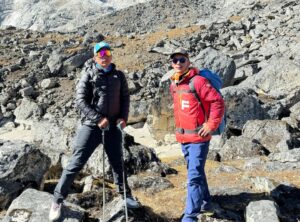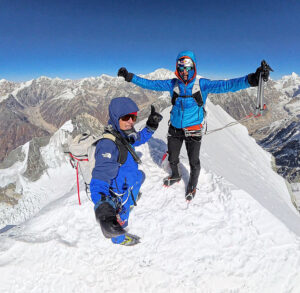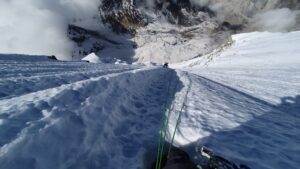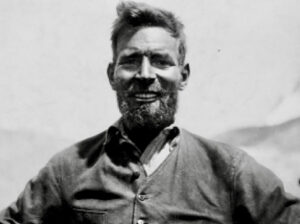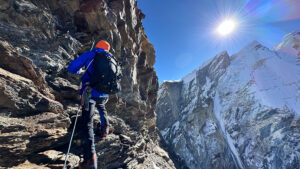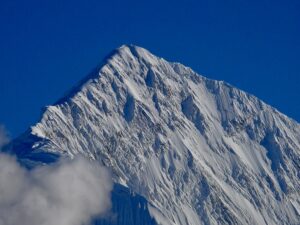Tyler Andrews is currently relaxing on Thailand’s beaches after bagging six FKTs in 26 days in Nepal.
Just before submitting them to Fastestknowntime.org, the American sky-runner shared his thoughts about the potential of FKTs in the Himalaya.
Andrews set the fastest known times on the Three Passes Tour, Ama Dablam from Pangboche, Lobuche East, Nangkartshang Peak, Chukkung Ri, and Island Peak. Ueli Steck, the late, great Swiss Machine, held three of them, but Andrews was quite surprised to find little competition on the others.
“FKT pursuers (at least in the U.S.) mostly come from the running scene and they think they’re going to freak out with the altitude and its potential dangers,” he said. “In my case, I’ve always done well at altitude so it didn’t bother me. Anyway, I think FKTs have already spread to the Alps, the Rockies, and the Andes. We’ll see more and more speedsters in the Himalaya, which is kind of the next level.”
He suspects that not only professionals will come to break prominent records. Amateurs too will target times on the iconic trekking routes, once they realize that a trip that usually takes a week can be done in a single day by running.

Photo: Tyler Andrews
A growing trend
Andrews says the FKT culture is growing exponentially, especially since the COVID-19 pandemic. Since all competitions were canceled, many runners went for individual challenges like FKTs instead.
Andrews understands that Himalayan peaks are not typical terrain for this sort of activity.
“It’s not even like Aconcagua, where you can walk/run more than climb. Peaks here are more complex, and objective risks have kept most people from going too fast. But commercialization has made the mountains more accessible and that has set the groundwork for quicker ascents.”
As an example, Andrews admits that his FKT on Ama Dablam would have been impossible without fixed ropes.

On the summit of Ama Dablam. Photo: Tyler Andrews
In fact, other recent ascents have also highlighted the growing trend. Pemba Gelje Sherpa summited Manaslu in 12 hours from Base Camp, shattering the previous best time by an hour, Matheo Jacquemoud did 6 hours 23 minutes for the round trip on Ama Dablam, and Benedikt Boehm and Prakash Sherpa summited Cho Oyu in 12 hours and 35 minutes.
Changeable conditions
Many experienced climbers state that speed records make little sense on big mountains because conditions change so dramatically. In an interview with ExplorersWeb, Kilian Jornet said that because of this, the term FKT was more accurate than the traditional “speed ascent.”
“Conditions have a great impact on how fast can one move,” admits Andrews. “I experienced that on several speed ascents on Cotopaxi. But the thing is, conditions affect any outdoor sports competition. Temperature affects a marathon, which makes the competition even more interesting. A marathon runner who completes the race in high humidity is probably stronger than the one who made the fastest mark ever, but a world record is a world record.”
As for the correct term, Andrews says he uses both interchangeably. “Not everybody knows what an FKT means,” he says, “but everyone understands speed record.”
Support on Manaslu
Andrews climbed Manaslu with the support of Asian Trekking’s Sonam Sherpa. He started on his own from the town of Pangboche and met Sonam at Camp 2. From Camp 3, the sherpa switched on his oxygen so that he could keep pace with the runner. Andrews didn’t feel well above Camp 3 and eventually turned around without summiting, although he had summited a week earlier at a more relaxed pace.
“I was never short-roped, we were both on fixed lines, but Sonam was there in case something went wrong,” Andrews said. “I’m more of a sky-runner than a technical climber, so I wanted to have that support on my first 8,000er,” he said.
Certification and categories
Fastestknowntime.org has specific guidelines for records and an independent body of people who review claims. FKTs have three different styles: unsupported, self-supported (generally related to some preparation, such as cached supplies), and supported.
Supported means you had any kind of outside aid, whether it was a sherpa short-roping you or someone who handled your water bottle. Every item of aid must be noted, from the use of fixed ropes to help carrying loads. Information should be backed with photos and videos. All ascents are live-tracked, and the tracks must be submitted.
The use of O2 must be noted as well, “but I just wonder whether a fast ascent with supplementary oxygen makes sense at all,” Andrews said. “Likewise, I don’t think that [short-roping] would be allowed under the FKT criteria. A rope team would be okay, but not being pulled by someone else.”

Andrews signals his third record summit this fall. Photo: Tyler Andrews
Andrews’ marks in Nepal
I ended up setting 6 FKTs/Speed Records in 26 days, starting w/ the 3 Passes Loop and finishing up with Island Peak a few days ago. Here’s a quick summary:
Three Passes Loop – (three high points of 5,300m to 5,500m)
85km, 5,000m+
19 hours 40 minutes 55 seconds
Previous record: 36 hours by Pemba Sherpa
Ama Dablam (6,814m)
Pangboche to summit (and round trip)
16km, 3,000m+
7 hours 4 minutes 10 seconds (to summit)
Previous record: 10 hours by Pemba Sherpa
Round trip: 32km, 3,000m+
13 hours 18 minutes 33 seconds
Lobuche East (6,119m)
Dzongla to summit
8km, 1,300m+
1 hour 36 minutes 33 seconds
Previous record: 1 hour 49 minutes by Ueli Steck
Nangkartshang Peak (5,089m)
Dingboche to Summit
3km, 773m+
36 minutes 26 seconds
Previous record: 43 minutes 6 seconds by Olivier Robelin
Chukkung Ri (5,572m)
Chukkung to Summit
3.1km, 828m+
45 minutes 28 seconds
Previous record: 53 minutes 21 seconds by Ueli Steck
Island Peak (6,189m) Chukkung to summit (and round trip)
11km, 1,600m+
3 hours, 6 minutes, 38 seconds
Previous record: 3h29 by Ueli Steck
Round trip: 22km, 1,600m+
5 hours 29 minutes 23 seconds
Previous record: 6 hours 15 minutes by Ueli Steck

